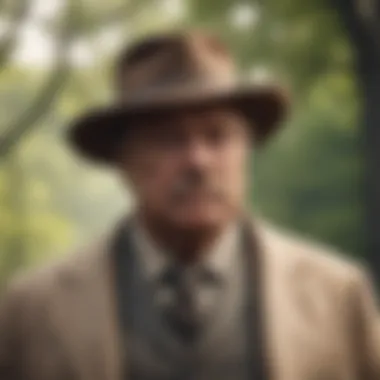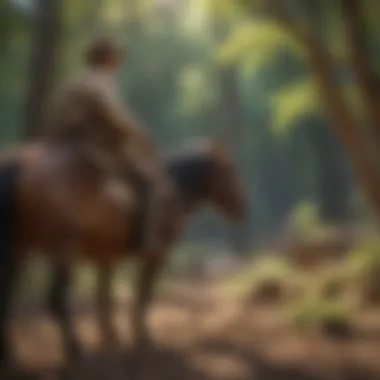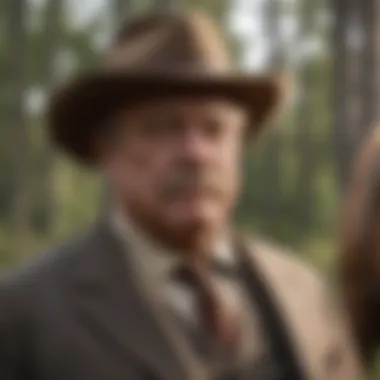Key Insights into Theodore Roosevelt's Life and Legacy


Intro
Theodore Roosevelt remains a compelling figure in American history. His life was marked by academic achievements, explosive personality, and a passion for the natural world. This deeper understanding of his contributions to politics, conservation, and society is valuable. It allows for greater insights into leadership and responsibility.
Roosevelt's journey started not with grandeur, but with challenges like illness and personal tragedy. These experiences shaped his distinct character, which will be explored through various lenses, showcasing why he is still remembered today.
Nature Topic Overview
The life of Theodore Roosevelt indeed revolves around nature. He made it a priority during his presidency, leading to significant environmental policies. Roosevelt recognized the importance of preserving the nation’s natural beauty. He saw the right balance between development and conservation. This balance has impact even today—an issue that should concern all generations. By examining this topic, we gain respect for both nature and our shared responsibilities.
Fun Facts and Trivia
Explaining Theodore Roosevelt to young minds doesn't have to be dull. Fact and trivia can make history come alive. Here are some engaging items:
- Roosevelt was the first sitting president to ride in an airplane.
- He also appeared in the first movie made about a president.
- Roosevelt had a pet lion named Jonathan that he received as a gift.
- He helped create five national parks and eighteen national monuments.
Finding ways to connect these facts with interactive visuals can make them more appealing. It allows learners to engage and foster a true interest in history.
Wildlife Explorations
Roosevelt's love for nature is evident. He upheld not only scenic views, but also the creatures inhabiting them. Here's a glimpse:
- American Bison: Roosevelt championed their preservation, advocating for policies to protect dwindling herds.
- Black bears: A symbol of Katskills Region, these bears represent the strength of American wildlife that Roosevelt fought for.
By studying such species, children can understand why they exist intact today. Puzzles linking animal facts with the environments they live can enhance children's appreciation.
Environmental Awareness
At the heart of Roosevelt's environmental initiatives is sustainability. Young audiences can learn about their role in conserving nature. To replicate Roosevelt’s commitment, here are some interpretation methods:
- Plant trees or native plants.
- Clean up trash in local parks or beaches.
- Spread awareness through simple infographics made at home.
Children can see the immediate impact of their contributions, creating long-term love for nature's surroundings. Encouragement in environmental teachings starts a meaningful dialogue in communities.
DIY Nature Activities
Hands-on activities make learning fun. Here are some ideas that parents and teachers can follow with children:
- Leaf Rubbing: This shows the beauty of different tree species around.
- Birdhouses: Building them can invite wildlife into their surroundings, sparking curiosity about nature.
- Nature Journaling: Kids can track different species, learn factual information, and illustrate observations.
Outdoor exploration rounds out understanding. Simple guided activities can enhance that learning experience. They allow for discovery right in the world around them.
Let Roosevelt's legacy live on through nurturing an appreciation for nature. Classroom projects inspired by his goals support a children’s development into responsible citizens.
Preface to Theodore Roosevelt
Theodore Roosevelt stands as a prominent figure in American history, influencing both politics and society in notable ways. This section will lay the groundwork for understanding first his formative experiences, his education, and the adversities he overcame. Roosevelt's life encompasses rich lessons of leadership, resilience, and change - all critical components for readers to appreciate his character and achievements.
Early Life and Background
Theodore Roosevelt was born on October 27, 1858, in New York City. His family background was affluent, providing him with opportunities that shaped his early years. Despite the privilege, Theodore faced challenges early on. He was often sick as a child; conditions like asthma limited his activity. This adversity pushed him towards a world of books where he found solace in reading.
Roosevelt grew up in a household that valued education, and his father instilled a sense of duty and morality in him. These aspects would deeply influence his future decisions and policies as a public servant. Growing up in a prominent American family, he observed issues of social justice, which left an indelible mark on his views.


Education and Early Influences
Theodore went on to attend Harvard University, where he cultivated his passion for wildlife and the sciences. His education at Harvard sharpened his thoughts on American foreign policy, governance, and civic duty. These teachings would remain central to his presidency.
Beyond formal education, he faced mutual influences from family travel experiences, where he explored places like Europe and South America. Traveling opened his eyes to different cultures and systems of governance. This exploration motivated him to think critically about what was achievable back home in the United States.
Health Challenges and Personal Resilience
Roosevelt's battle with health issues in his youth instigated a strong desire to embrace life. After a severe asthma attack, his father advised him to confront and control his fears. Influenced by this lesson, he began building trust in his physical capabilities, engaging in sports and outdoor activities.
His resilience became a defining trait. In adulthood, Roosevelt constantly pushed past physical limits, often embracing adventure as hunting or hiking in strategic conservation efforts. His tough experiences laid a foundation for his perseverance in political and personal realms, showcasing his robust spirit.
"Far better it is to dare mighty things, to win glorious triumphs, even though checked by failure, than to rank with those poor spirits who neither enjoy much nor suffer much, because they live in the gray twilight that knows not victory or defeat." - Theodore Roosevelt
Understanding these elements of Roosevelt's early life is crucial in appreciating later choices he made and the courage he displayed in political leadership.
Political Ascendancy
The political ascendancy of Theodore Roosevelt marked a significant turning point in American politics. This phase in his life reveals how a complex interplay of personal circumstance and national need propelled him into positions of power. Understanding this era gives insights into his character and the foundation of his future policies.
Entry into Politics
Theodore Roosevelt's foray into politics began in earnest when he was chosen as a New York Assemblyman in 1882. This position gave him a platform to voice his progressive ideas and advocate for reforms. Roosevelt found early challenges in the assembly where he tackled issues related to corporate influence over politics.
He was known as a staunch foe of corruption, prioritizing legislative practices that aimed to assist the common people. A standout moment came when he pushed for reform measures to address the exploitation by monopolies. This early stage of his career was critical, showcasing his determination and ability to attract attention to important societal concerns. His passion and energy opened new avenues, leading him through various political roles.
Roles in New York State
During the next years, Roosevelt held several key positions within New York State's political framework. His roles included being the president of the Police Board of New York City, a position he took on in 1895. Here, he implemented stringent reforms and worked hard to eliminate the graft that had plagued the city’s law enforcement.
Following that, he served as the Assistant Secretary of the Navy. His tenure during the onset of the Spanish-American War put him at the forefront of significant military and diplomatic decisions. Roosevelt's authority, particularly during this time, demonstrated his capability as an organizer and leader. His reforms garnered him popular support, which later formed an essential pillar backing his greater aspirations in national politics.
Becoming Vice President
In 1901, Roosevelt achieved a remarkable transition from a stint of active reformer to the office of the Vice President of the United States. His nomination came as a surprise, largely as a strategic move by the Republican Party to sideline him due to his growing popularity. Many believed his aims for progressive reform rattled conventional politics.
Despite the constraints of vice presidency, he used this time to prepare for more influential action once President William McKinley was assassinated in September 1901. That abrupt transition not only elevated him into the presidency but also set the stage for Roosevelt’s significant imprint on national policy.
Presidency Overview
Understanding the Presidency of Theodore Roosevelt offers key insights into his approach to leadership. His time in office ran from 1901 to 1909, a period marked by significant advancements in American society. Roosevelt wasn't just a president; he was a reformer committed to the welfare of the average American.
Key elements defining his presidency include strategic policies, ambitious legislation, and the nurturing of a progressive mindset among citizens. His administration focused on addressing inequality, advancing social justice, and enhancing America's role in the global landscape. Through his presidency, Roosevelt created a sense of trust and engagement with the American people. This laid the groundwork for modern governance.
The Square Deal Philosophy
The Square Deal philosophy exemplified Theodore Roosevelt's promise to treat every American equally. It was a crucial aspect of his presidency. This ideology encapsulated three main ideas: conservation of natural resources, control of corporations, and consumer protection.
- Conservation of Resources: Roosevelt valued nature and aimed to conserve it for future generations. He created numerous national parks to preserve the landscape.
- Control of Corporations: He believed that businesses exercising unchecked power could harm ordinary citizens. Hence, regulating corporations emerged as a primary goal.
- Consumer Protection: Ensuring consumers were safe from misleading products was vital. This focus resonated deeply, making everyday life easier for families across America.
Roosevelt stated, "A public servant is a trustee for the whole people."
By promoting the Square Deal, Roosevelt sought to create balance and fairness in a rapidly changing world.
Trust-Busting Initiatives


Roosevelt earned the identity of a trust-buster during his presidency. His motives behind this term involved dismantling monopolistic corporations that exploited consumers. The driving idea was that large companies sometimes acted against the common good.
He aggressively enforced the Sherman Antitrust Act, targeting corporations like Northern Securities Company. This approach fostered competition and reduced consumer prices. Additionally, Roosevelt's actions broadened the scope of federal authority, dealing directly with corporate power. His conviction laid the foundation for legal measures that still affect businesses today.
Regulatory Reforms
The regulatory reforms under Roosevelt marked a transformation in government intervention. His primary objective sought to establish fair practices in various industries. This involved pushing for federal regulation in the railroad industry and establishing the Food and Drug Administration.
These reforms initiated a new culture of accountability for businesses. Railroads were subjected to government oversight, improving safety standards and minimizing accidents. Furthermore, food inspection and labeling laws improved public health conditions significantly.
The reforms of Theodore Roosevelt are still echoes in today's society. His leadership framework for regulations ensured consumer safety, promoting American welfare across the nation.
Conservation Efforts
The conservation efforts of Theodore Roosevelt stand as some of the most significant achievements of his presidency. He recognized the urgent need to preserve America’s natural landscapes and wildlife for future generations. Roosevelt’s commitment significantly shaped the American conservation movement and laid the groundwork for future environmental protection policies. His view was not just about beauty, but about sustainability and respect for resources.
Establishment of National Parks
One of Roosevelt's landmark actions was the establishment of national parks. As a naturalist, he understood the importance of preserving pristine wilderness. During his presidency, he created five national parks, such as the Yosemite National Park and Grand Canyon National Park.
Not only did Roosevelt expand the national parks system, but he also designated millions of acres as national forests and wildlife refuges. This preservation effort was a revolutionary idea, growing awareness among citizens about their need to protect natural habitats.
Key Points of National Park Creation:
- Maintains unique ecosystems.
- Provides spaces for recreation and education.
- Serves as a sanctuary for various species.
- Boosts local economies through tourism.
The Role of the Public and Education
Roosevelt knew public engagement was critical in conservation. He believed education was key to nurturing a spirit of stewardship among citizens. He supported measures that brought awareness to the conservation agenda. This included public lectures and educational campaigns focusing on the importance of nature.
Additionally, his administration funded outreach initiatives that encouraged young people to appreciate wildlife and conservation. Programs were created in schools to involve children in nature-related activities.
Educational Highlights in Conservation:
- School projects promoting wildlife awareness.
- Community groups tackling local environmental issues.
- Collaborations with organizations like The Sierra Club.
Legacy of Environmentalism
The legacy of Roosevelt's conservation efforts is vast. He transformed public perception of nature from mere resource exploitation to valuing conservation. Many eco-policies rely on his vision today. Organizations, local to global, still draw onions from his principles. This legacy has sustained and inspired activism and insight into ecological balance.
Military Achievements
The topic of Theodore Roosevelt's military achievements is significant in understanding his character, leadership style, and impact on American history. Roosevelt's experiences in the military not only showcased his courage but also highlighted his abilities as a strategist and a commander. During the late 19th century, many Americans rallied around patriotic ideals, and Roosevelt embodied this spirit. His involvement in military conflicts was instrumental in shaping his public persona and ultimately propelled him into the political limelight.
Rough Riders in the Spanish-American War
One of the most celebrated chapters in Roosevelt's military history is his leadership of the Rough Riders during the Spanish-American War. Officially named the 1st United States Volunteer Cavalry, the Rough Riders were a diverse group of volunteers, many with little prior military experience. Roosevelt resigned from his position as Assistant Secretary of the Navy to join this eager regiment, which gained fame for its charge up San Juan Hill in Cuba.
This pivotal battle exemplified Roosevelt's fearless nature. He led his troops with determination and strategic vigor.
- The Rough Riders consisted of cowboys, college athletes, and Native Americans.
- Community engagement played a role in rallying volunteers and support for the war.
- The rough terrain and difficult conditions tested the mettle of his unit.
Despite being just one of many military leaders, Roosevelt's ascendance post-war as a result of his heroism was significant in shaping American nationalism at that time.


International Diplomacy
Roosevelt’s military achievements extended beyond conventional battlefields. His adeptness in diplomacy was highlighted during his presidency when he navigated international tensions, notably in his handling of conflicts in Latin America and Asia. His
The Legacy of Theodore Roosevelt
The legacy of Theodore Roosevelt is a vital component of understanding his life and achievements. As the 26th President of the United States, he made impacts that resonate today. His policies and values have influenced how leaders approach governance and public service. Roosevelt's legacy delves into the founding principles of progressive politics, strong environmental conservation efforts, and an assertion of America's position on the global stage.
Influence on Future Leaders
Theodore Roosevelt's leadership style has left a profound mark on future presidents and public figures. He epitomized the concept of a dynamic leader who tackles issues with fervor and courage. Many notable leaders cite Roosevelt's embrace of bold actions as critical inspiration for their paths. Notably, Franklin D. Roosevelt and John F. Kennedy have notably drawn from his principles.
Key aspects of his influence include:
- Emphasis on strong executive action: Roosevelt shifted the role of the president to include more direct involvement in legislative processes.
- Advocacy for social justice: He supported initiatives aimed at helping the working class and addressing social inequities.
- International stewardship: Roosevelt promoted American involvement in global affairs, notably emphasizing peace and diplomacy.
Understanding how Roosevelt shaped leadership ideals helps individuals see the transformative potential of proactive governance.
Cultural Depictions
The impact of Theodore Roosevelt on culture is evident in literature, films, and symbols. His larger-than-life persona and philosophy of rugged individualism have made him a frequent subject. His vigorous presence transcends the years, bringing insight into American identity.
Significant cultural representations include:
- Literature: Many authors, such as Doris Kearns Goodwin, explore Roosevelt's life in their works. They examine his character traits, victories, and flaws, presenting a nuanced view of the man.
- Television and Film: Documentaries and biopics illustrate his adventurous spirit and iconic moments, strengthening the public's fascination with his legacy. For example, the Ken Burns documentary series deeply investigates his transformative policies.
- Memorable imagery: Roosevelt is often seen riding a horse, symbolizing vitality. He is represented in memorials and statues, often regarded as an American hero by those who admire his pioneering spirit.
Relevance in Modern Governance
The principles advocated by Theodore Roosevelt hold considerable relevance in today’s political environment. Leaders reference his staunch opposition to monopolies and corporate power as a guide to balancing economic interests and the public good. Furthermore, his commitment to natural conservation is a modern call to action as climate change becomes a prevalent issue.
Present-day implications of his philosophies involve:
- Regulation and reform: Roosevelt’s assertive stance against corporate monopolies is important for ongoing discussions on market fairness.
- Environmental stewardship: His groundwork led to the establishment of national parks and the conservation movement. Today, environmental advocacy groups reflect his legacy in the pursuit of protecting nature.
- Active citizenship: His belief in a democratic and engaged citizenry encourages modern constituents to participate in their governance actively.
Roosevelt's decisions suggest that leadership is more than guiding others. It embodies the courage to effect significant change.
The varied dimensions of Roosevelt's legacy remind us not only of what he accomplished but of the enduring relevance of his ideas as guides for contemporary leaders.
Closure
The topic of Theodore Roosevelt's life and legacy is significant to this article because it encapsulates his vast influence on American history and improvement. Understanding his journey provides insight into how diverse factors portion together to shape leadership. His 'Square Deal' approach reflects strong public service ideals and sets a moral standard for future leaders. Social justice, environmental conservation, and military engagement also mark his time.
Summary of Contributions
Theodore Roosevelt made several key contributions that are vital for considering his role in shaping the United States. His commitment to environmental preservation led to vast national park systems and monuments. This effort had a lasting impact on America’s relationship with nature.
- He established approximately 150 national forests,
- Initiated five national parks,
- Created 18 national monuments.
Roosevelt’s role in regulating monopolies and promoting fair competition resonates in modern governance. His initiative with the Hepburn Act limited railroad rates, demonstrating his action against corporate greed. Often called a 'trust-buster,’ he set precedents crucial for economic regulation.
Reassessing His Impact
Reevaluating Theodore Roosevelt's impact reveals a leader who embraced complexity. His assertive policies serve as reminders for ethical leadership, fostering a balance between ambition and responsibility.
- Roosevelt's diplomacy in managing international conflicts showcases how a strong character can navigate challenging global dynamics.
- His award of the Nobel Peace Prize exemplifies his dedication to peace and resolution, particularly in the face of significant challenges.
Moreover, discussions surrounding his legacy indicate a growing relevance, as modern societies seek models for engaged leadership.
"The test of our progress is not whether we add more to the abundance of those who have much; it is whether we provide enough for those who have too little." - Theodore Roosevelt
In summary, Theodore Roosevelt’s contributions and the repeated examination of his role offer enduring lessons about responsibility, leadership, and commitment to public service. Understanding these facets is vital for future grassroots movements and leadership in any field.







